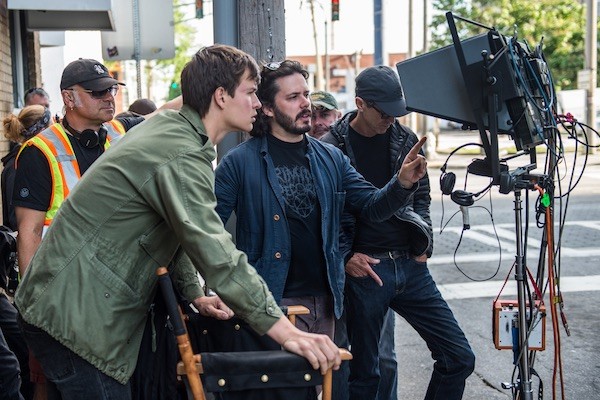Interview: Edgar Wright on 'Baby Driver', film-making, and his love of Mini Mansions.
Interview: Edgar Wright on 'Baby Driver', film-making, and his love of Mini Mansions.

Edgar Wright is worriedly asking me how I managed to bring him his favourite candy, Junior Mints - “Are you allowed to bring food into the country, because I thought customs were tough on that? You basically smuggled these in!” But all concern aside, he’s undeniably thrilled to receive a gift of his favourite snack during a press tour that has taken him [and the film’s star Ansel Elgort] all around the world.
His 2017 release ‘Baby Driver’ is a bonafide success - the car-heist/crime/lovestory with Elgort behind the wheel has not only won over the love of the worldwide box office (grossing over $138 million), but the critics too, with the film receiving an approval rating of 94%.
We spoke to Edgar about the critically acclaimed film while he was in New Zealand on a whirlwind press tour...
COUP DE MAIN: I found it interesting that some of the most crucial dialogue moments don’t actually happen through traditional dialogue - instead either mouthing words (Baby saying “I’m sorry” to Deborah in the final moments before he turns himself in), or through lyrics of the soundtrack. Did you find it important to explore other ways to make people feel in a film other than just literal dialogue?
EDGAR WRIGHT: Yeah, it’s funny you mention that actually because my previous films have all been very verbose and they have a lot of dialogue. One thing I’ve noticed, even though I am very proud of those movies, is that those movies would never travel as much, they would do well in English-speaking countries but less so in non-English language territories. So I did think with this movie that I thought it’d be interested to let actions speak louder than words in quite a few places, so it is definitely the intention to make it a less wordy movie. Also because it is about sound and music, that there are just different ways of communication - obviously there are some scenes done with American Sign Language and there are some scenes where big parts of the movie rely on the characters mouthing something or just shaking their head. So that’s something that was always important.
CDM: I also really love that you managed to slip in a split second of your ‘Blue Song’ music video into the film. You've got such an eye for attention to detail - what is it about these little moments and intricacies that you find so important to include into your film-worlds?
EDGAR: I guess I don’t really think about it in that way. I just think sort of that you are just trying to create the world and you want to make the world feel really detailed, so as you are putting that together you want to just make the world fully realised and have all the details about it.
CDM: Are there any other directors or films who you really love the tiny details of?
EDGAR: The Coen Brothers, I think they always do an amazing job at that. Wes Anderson, Quentin Tarantino. There are a lot of directors that have fully detailed, fully realised worlds.

CDM: So in ‘The World’s End’ you had a vocal cameo, but I saw you tweet saying that you have a real Hitchcock cameo in ‘Baby Driver’?
EDGAR: Oh yeah, if you look closely in the opening sequence you can see me reflected in one of the shop windows.
CDM: We spent the second time watching it trying to find it and I couldn’t see it!
EDGAR: Well you’ll have to watch it a third time, <laughs> I’m definitely in there. You know what’s funny, it wasn’t purposeful. I was following the steadicam shot and ended up in the shot and I was carrying a big monitor so I was going to get the special effects people to digitally erase me from the shot which they could do, but then they thought, ‘Or we could just change your monitor to an iPhone.’ So basically, I’m just in the movie looking at my iPhone.
CDM: You are probably one of the only people in the movie with an iPhone then?
EDGAR: Well what I think is a funny thing about it, most people comment on the fact that Ansel [Elgort] doesn’t use a smartphone or a laptop but one of my favourite things in the movie is there is a scene where Ansel comes in and sits in the corner and the ‘adults’ like Jon Hamm and Jamie Foxx and Eiza González are all on their smartphones texting and stuff.
CDM: I really respect that you put back some of your directing fee into the production budget so that you were able to keep the on-foot-chase in the third act of the film - money is obviously the driving force of how a lot of films get made, and can cause limitations. Creatives definitely have a hard line to balance, because they have a vision, but it also needs to be financially viable. How important was it for you for ‘Baby Driver’ to play out exactly as you’d written it, with no compromises?
EDGAR: Well again, I think those are things that you feel in your gut. You know when you are doing something, what things are really important and so if there is something and they say, ‘Oh do you want to cut some of this scene?’, and you go, ‘No I think this is going to be one of the best scenes in the movie, so we’ve got to go for it,’ and you know sometimes you have to put your money where your mouth is? It’s not ideal and I think hopefully I’ll get that money back at some point. <laughs>

CDM: You’ve mentioned that Sony are interested in a ‘Baby Driver’ sequel - which is rad - do you think this is what you will be working on next? I know there’s lots of other upcoming projects that you’re tied to - ‘Fortunately, The Milk’, and ‘Grasshopper Jungle’…
EDGAR: That’s very much TBD; I think it is definitely something that is being explored. But what the exact next movie is, is gloriously up in the air at the moment.
CDM: So much of how Baby expresses himself is based on pop culture - he talks in phrases he takes from movies like ‘Monsters Inc’. For someone growing up today, what pieces of pop culture (music/film/TV) do you think are going to become those key reference points?
EDGAR: I don’t think it necessarily even has to be a famous film. I think a lot of people have that experience when you are growing up, where you copy things that you’ve heard in movies and TV shows that you sort of pick up. In the same way that you read, you pick up phrases in reading and you also pick up phrases watching things. It’s a lot of ways that you sort of learn how to say things or do things. I think the thing is that Baby is a bit like a sponge, in terms of he sort of picks up vernacular that he’s heard in TV, radio, films and music. Sometimes he kind of uses that as his own dialogue. So there is quite a lot of stuff where I think Baby is very observant - there is a whole other scene where he is reading people's lips and he can take in a lot of stuff and then reinterpret it in a different way, so there was always that idea. It’s something I used to do when I was a kid, just watch the TV and then somehow at school the next day you would sort of copy something that you had heard in ‘Cheers’.
CDM: Maybe in 20 years, there’ll be a film with a character who uses phrases from ‘Baby Driver’!
EDGAR: Baby Driver Junior!

CDM: So the Cornetto Trilogy had a specific flavour for each film. If you were to assign a flavour for ‘Baby Driver’, what would it be?
EDGAR: <laughs> That’s a very good question. Let’s go with Junior Mints!
CDM: Would you ever do another trilogy of films with Simon Pegg, or with anyone else?
EDGAR: I don’t know, it depends really. I mean, I don’t know… I think me and Simon would like to do something else together again, but I don’t think we want to do something in that series again, it would be something different. I thought it would be funny to do a trilogy of films with song-titles, that would be quite funny - so this is one of them, but that’s not official.
CDM: Some of the love songs that you used in the film have a cruel irony in their context - ‘Nowhere To Run’ turns into a total stalker anthem. What do you think is the strongest human emotion? There’s kind of a fine line between love and hate, as evidenced by those songs.
EDGAR: That is a very heavy question. I think the idea is taking songs and giving their lyrics a different context, that is something that kind of happens sometimes, you could be listening to a love song, but you could be in a certain place where it’s like, ‘Oh, this means something completely different to me right now.’ The Barry White song [‘Never, Never Gone Give Ya Up’] as well, you take the lyrics of that song and you put it in a different context and then suddenly the song starts to take on a completely different meaning. I think it is just a different way of interpreting songs; lots of love songs are about obsession in a way and that could be a positive but also a negative thing.

CDM: Respect that you still have your iPod Classic, and might need to buy a new one from eBay soon. Please tell me you just took the pink glittery one from the movie as a memento? It’s very stylish.
EDGAR: I did not! They are very strict about you not taking props and stuff which is annoying, so I do not have the pink glittery one. I wish I did.
CDM: On a brighter note, we bought you a present of Mini Mansions’ B-Sides release ’Flashbacks’ on vinyl, as we know you’re a big fan of Mini Mansions.
EDGAR: Oh yeah! Signed by the band? Oh wow, it’s great. I’ve never met those guys even though we e-mail quite a lot. Where did you get it signed by them?
CDM: We saw them in Los Angeles and we mentioned that we were going to be interviewing you.
EDGAR: Awesome, that’s fantastic. Thank you! I do like this album a lot.
CDM: Can you please make directing a Mini Mansions music video your next venture? I think they have a new album on the way…
EDGAR: <laughs> Maybe! They mentioned it to me actually.
Edgar Wright’s ‘Baby Driver’ is in cinemas now - watch the trailer below…




















